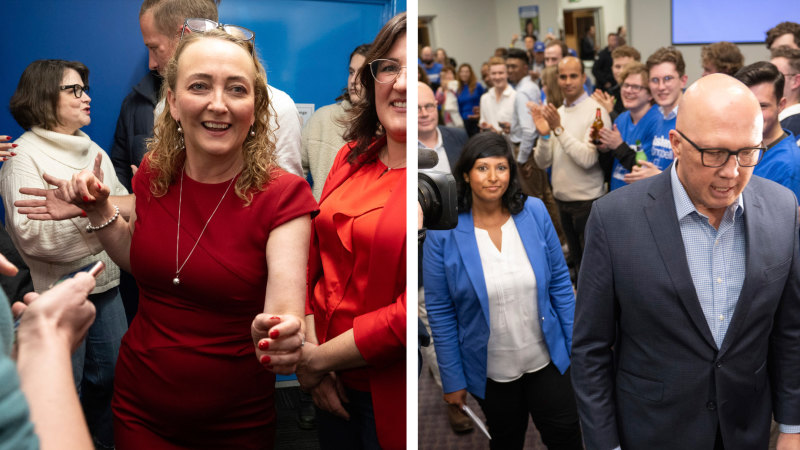The Victorian Liberal Party is unelectable and have no one to blame but themselves for voters abandoning them, the state president has told members.
The scathing assessment by Greg Mirabella follows the party’s devastating loss at the Aston byelection, which resulted in an opposition losing a seat to the federal government in a byelection for the first time in more than a century.
It also meant the number of federal Liberal MPs in metropolitan Melbourne has been whittled down to just two.
“Nothing on the ground made me think we didn’t have a chance,” Roshena Campbell said.
In an email to Liberal members on Tuesday afternoon, Mirabella said he had commissioned “detailed research” to better understand why the party was performing so poorly in the country’s second-largest state.
“It’s been a very, very tough few days since Saturday’s result. We broke a century-old record in the worst fashion imaginable,” Mirabella said.
Victorian Liberal Party president Greg Mirabella said the party brand was damaged in the state. Credit:Justin McManus
“I have deliberately waited a few days before sending this message. The press gallery and the finger pointers have all now had their say. So what are we to conclude?
“In the last 12 months the people of Victoria have made it perfectly clear that we are not electable. I think the major problem remains: us. Brand Liberal.”
The Liberal Party was pummelled on Saturday after it lost one of its heartland seats in Melbourne’s east following the retirement from politics of controversial former cabinet minister Alan Tudge. Labor’s Mary Doyle, who shaved 8 per cent from Tudge’s margin at the 2022 election, secured a further 6 per cent two-party preferred swing against Campbell.
Recriminations have already begun, with Opposition Leader Peter Dutton saying the Liberal Party’s vote in Victoria had been going backwards for more than two decades, while senior Liberal Simon Birmingham called for urgent action to confront dangerous perceptions that the party is intolerant, nasty and divisive.
Mirabella praised Campbell as a “standout candidate” and said the party could not have done much more to turn around her fortunes. But he said a post-byelection review was vital to understand how the electorate perceives “Brand Liberal” and then reposition it for future success.
Speaking to The Age, Aston candidate Roshena Campbell said she didn’t pick up on the size of the swing to Labor during the campaign.
“Having spoken to thousands of people in the lead up to the election, I didn’t sense this would be the result,” she said.
Campbell said while the reasons for the Liberal Party’s loss will need to be examined, it was clear the Albanese government was enjoying an extended honeymoon and voters didn’t blame the federal government for the cost-of-living pressures.
Labor’s Mary Doyle defeated the Liberals’ Roshena Campbell at the weekend.Credit:
She said while she accepted Aston was a “local contest”, there was “no doubt” the Liberal Party had to engage in serious policy work to be electable in the future.
“People need to see that we are going to make a difference to their lives,” Campbell said. “This is something that requires long-term work”
As a starting point, Campbell suggested policies to tackle housing affordability as one way the party could win back lost demographics, such as younger voters, professional women and multicultural communities.
Campbell, who will return to work as a barrister and Melbourne City councillor on Friday, said she would take some time to decide whether she would run as a candidate again, but said she would continue to contribute to the broader Liberal Party.
The Liberal Party has been in opposition for 20 of the last 24 years at a state level, and its federal members have not won a majority of seats in Victoria since 1998.
Tony Barry, director at RedBridge and former deputy state director of the Liberal Party, said there had been a dramatic demographic shift the party had not kept up with and that its members were more focused on winning culture wars instead of elections.
“In the past decade, we have allowed ourselves to be defined by what we are against and not what we are for,” Barry said.
“The Liberal Party’s core values are enduring values so what we should be saying to the electorate is if you share a vision of a free and expansive Australia that respects the dignity of the individual, if you aspire to own a home, run your own business, educate your children in accordance with your values, create wealth in a way that makes not just your life and your children’s lives better, but also contributes to the prosperity and connectedness of your communities, then you belong with us.”
Resolve Strategic director Jim Reed said while the Coalition had real issues, it was important to remember the primary vote of the two major parties are similar.
It is the growing “other” vote that is working against the Liberal Party, Reed said, with left-leaning parties preferencing Labor at a greater rate than right-leaning parties preferencing the Liberals.
“Labor has been able to position itself at the centre, or rather the centre has slowly shifted left to where Labor are, making them attractive to their traditional base, ‘small-L liberals’ to the right and minor parties to the left,” Reed said.
“[The Liberal Party] cannot thrive by exclusively trying to retain a dwindling base to the right who will vote for or preference them over Labor anyway. Reaching out further does create a number of challenges in motivating that base to volunteer, fund-raise and generate candidates of all persuasions, but long-term there’s no alternative but to evolve.”
He added the party’s structure must change to ensure it can effectively campaign against Labor’s machine.
The Morning Edition newsletter is our guide to the day’s most important and interesting stories, analysis and insights. Sign up here.
Most Viewed in Politics
From our partners
Source: Read Full Article


